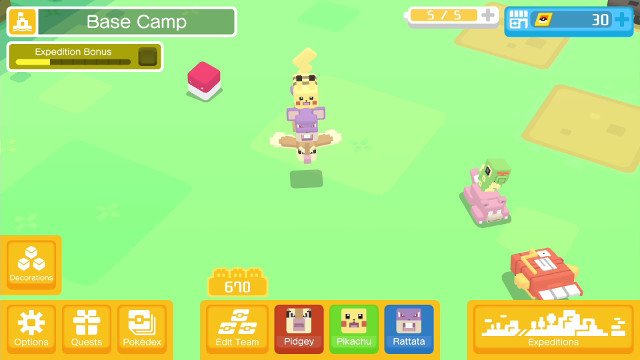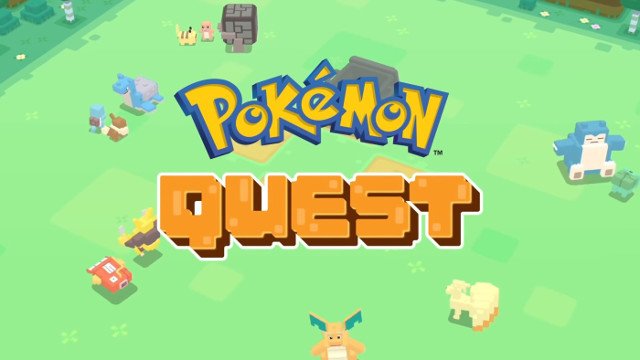Pokemon Quest isn’t what I would call a “good” game. An odd deviation from the established Pokemon formula, the pocket monsters have received a makeunder into voxel-style blocks, with the turn-based strategy of the core games replaced with simplistic base-building, crafting, and microtransactions. Yet I can’t stop playing it and I hate myself because of it.
Placing you in control (and I use that word loosely) of a trio of Pokemon, each battle foregoes the series’ traditional turn-based combat in favor of your captured critters running ahead and doing their own thing. You press ability buttons at the bottom of the screen to get them to pull off a more substantial attack, but they move around each battlefield of their own accord, bumbling into enemies and doing their own thing.
Though Pokemon Quest has received a Nintendo Switch release, it is a mobile game through and through (an iOS release is scheduled for June). Mobile games convince players to spend more cash on them by way of initially offering satisfying rewards in exchange for very little effort, before eventually limiting those rewards and hiding them behind paywalls. Like many mobile games reliant on microtransactions to turn a profit, Pokemon Quest spends 30 – 45 minutes patting your back before eventually refusing to acknowledge your accomplishments, just like your dad.
Pokemon Quest: Free-to-Play or Pay-to-Win?

The end goal is to get you to spend real money in order to keep those rewards coming in, or if you’re like me and refuse to buy microtransactions, keep you grinding indefinitely. Little does Nintendo know that I’m actually one of those idiots who takes sick pleasure in grinding, so here I am, repeating the same tasks ad infinitum because Pikachu ain’t taking my hard-earned $5.
In Pokemon, Nintendo has found a franchise that is perfectly adaptable to mobile gaming. People love Pokemon Go despite its flaws because people love catching Pokemon, and the main hook of Pokemon Quest is no different. You go out on expeditions in order to level up your currently owned monsters, along with finding ingredients you can use to craft recipes that will entice new ones to your base.
While idly sitting by as my Squirtle bumped into a rock before launching a tackle into the middle of nowhere, I was struck by a moment of clarity. “What am I doing with my life?” I thought to myself, a 27-year-old man who had found himself bound to this child’s game in pursuit of cute animals with cubes for heads. While Pokemon is enjoyed by people of all ages, make no mistake that Pokemon Quest is targeted at younger aspiring Trainers. An accessible mobile Pokemon game that doesn’t require you to leave your house will be a godsend for parents who want to keep their kids occupied, but who also don’t want them to get hit by a car.
Pokemon Quest: Microtransaction Mayhem

But the exact reasons why I’m finding myself so drawn to Pokemon Quest are also the reasons why parents should be wary. Though it’s certainly not as pernicious as other mobile games with its microtransactions, you can still feel its business model seeping through the cracks. The number of Pokemon you can own is limited by your storage box, while your Power Stones — the items you use to power up your team — are also restricted. PM Tickets are used to make upgrades, buy decorations that attract new Pokemon to your base, and speed up cooking recipes. They’re obtainable through gameplay, though more readily available in purchasable Expedition Packs.
I haven’t felt compelled to purchase anything yet, but like many mobile games before it, Pokemon Quest is designed to play on your impatience. Sure, you can wait to get the rewards it offers, or you could buy an item that speeds up your progress and bags you more Pokemon. I’m a masochist so I don’t mind grinding it out, but kids aren’t exactly well-known for having lengthy attention spans. If you’re a parent and think this is just another Pokemon console game, then be warned: they’re probably going to ask you for cash for Expeditions Packs sooner rather than later.











